Unit 5 The Value of Money Discovering Useful Structures课件(共26张)-2025-2026学年人教版必修第三册
文档属性
| 名称 | Unit 5 The Value of Money Discovering Useful Structures课件(共26张)-2025-2026学年人教版必修第三册 |  | |
| 格式 | pptx | ||
| 文件大小 | 1.2MB | ||
| 资源类型 | 教案 | ||
| 版本资源 | 人教版(2019) | ||
| 科目 | 英语 | ||
| 更新时间 | 2025-06-14 22:31:41 | ||
图片预览

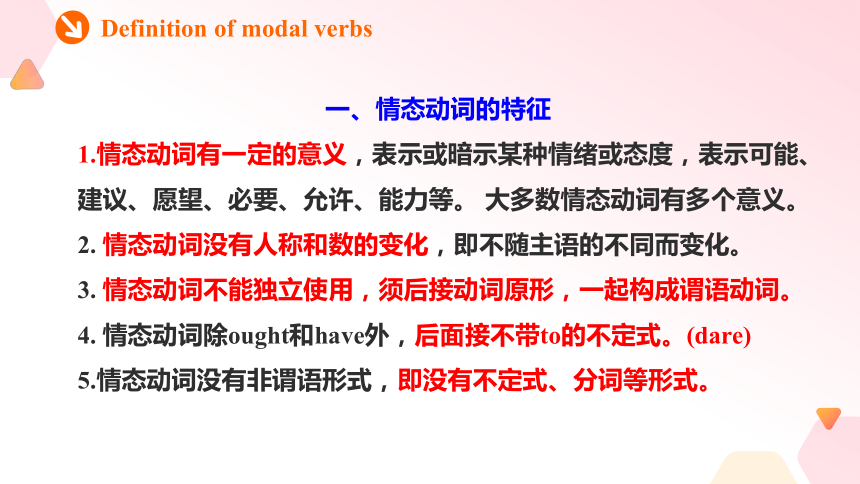
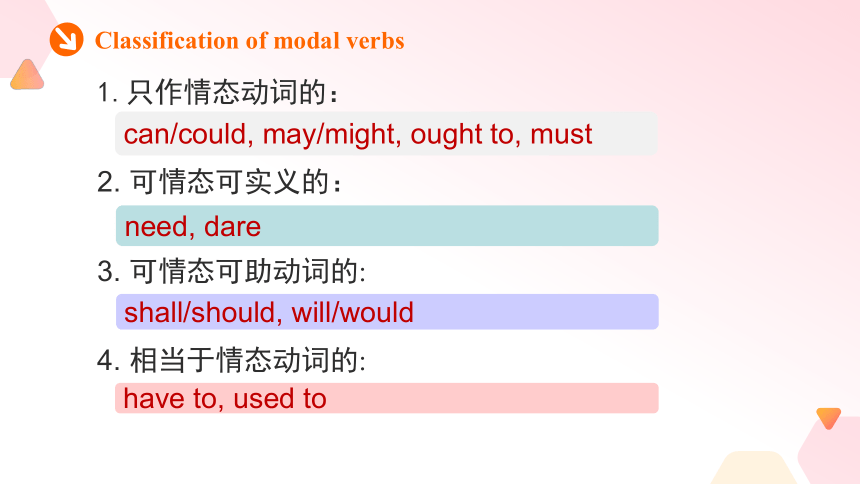
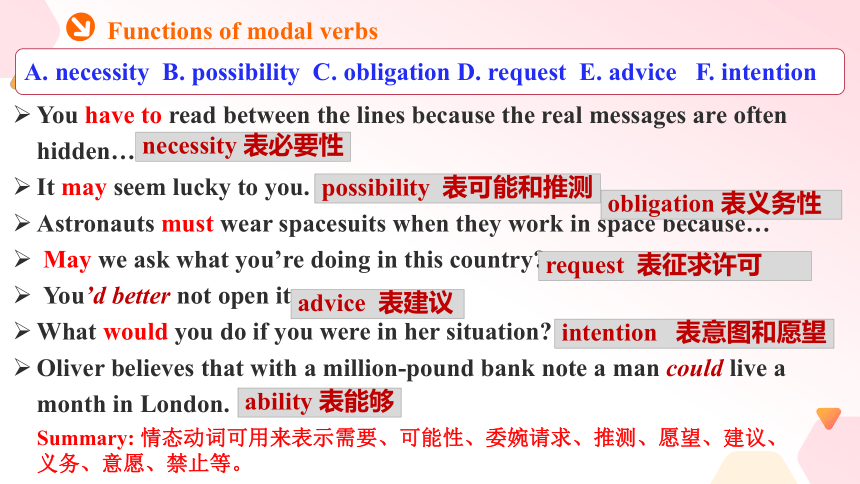
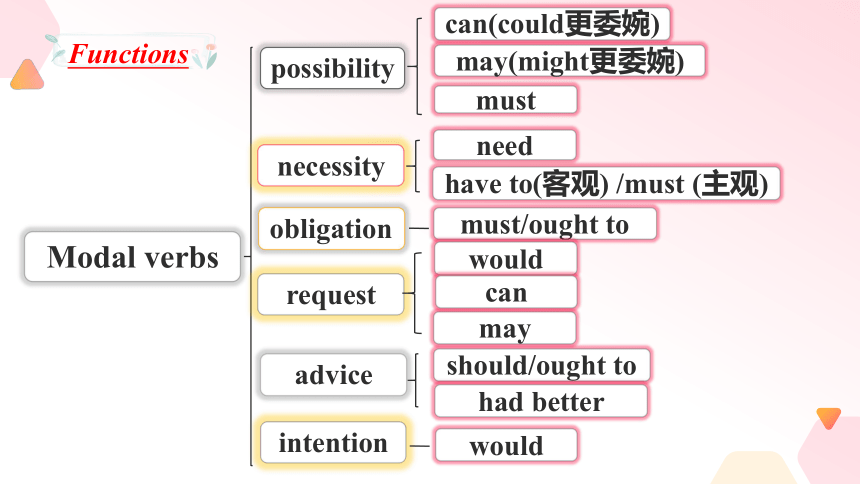

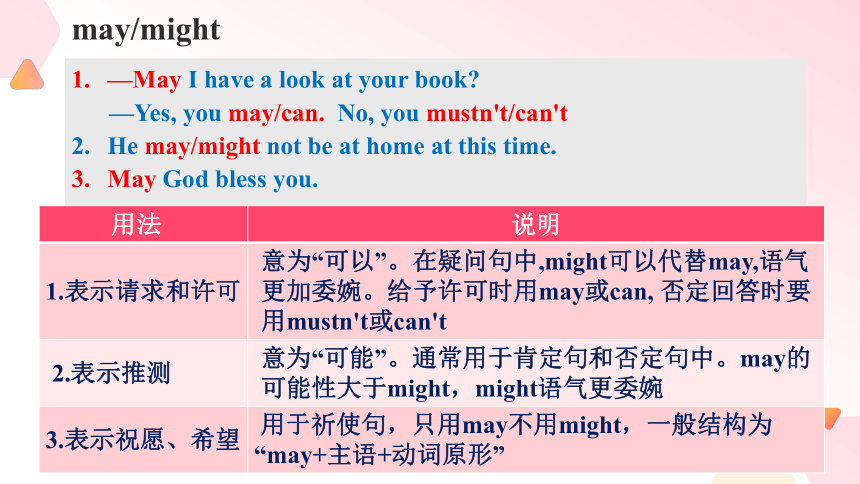
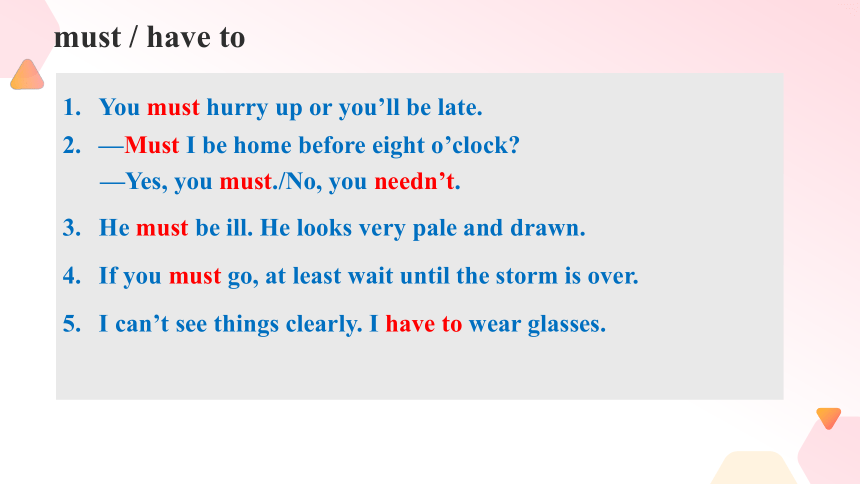
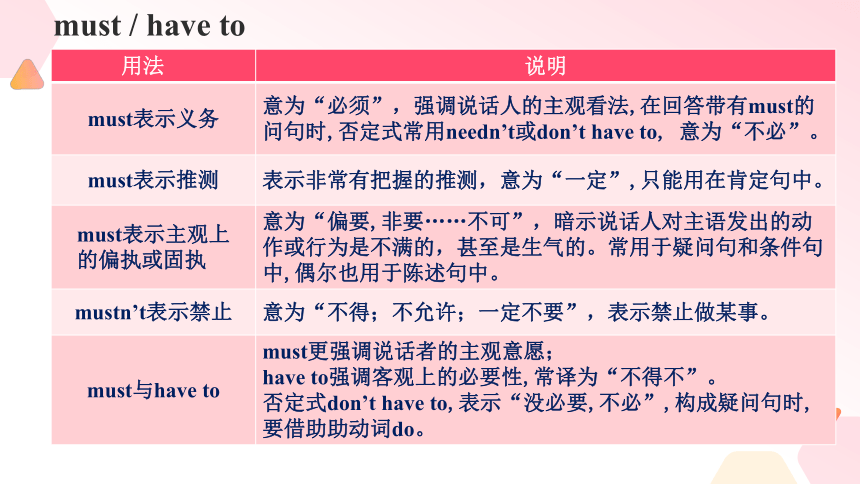
文档简介
(共26张PPT)
UNIT 5
THE VALUE OF MONEY
Discovering Useful Structures
Definition of modal verbs
一、情态动词的特征
情态动词有一定的意义,表示或暗示某种情绪或态度,表示可能、建议、愿望、必要、允许、能力等。 大多数情态动词有多个意义。
2. 情态动词没有人称和数的变化,即不随主语的不同而变化。
3. 情态动词不能独立使用,须后接动词原形,一起构成谓语动词。
4. 情态动词除ought和have外,后面接不带to的不定式。(dare)
5.情态动词没有非谓语形式,即没有不定式、分词等形式。
Classification of modal verbs
1.只作情态动词的:
2. 可情态可实义的:
3. 可情态可助动词的:
4. 相当于情态动词的:
can/could, may/might, ought to, must
need, dare
shall/should, will/would
have to, used to
Functions of modal verbs
Summary: 情态动词可用来表示需要、可能性、委婉请求、推测、愿望、建议、义务、意愿、禁止等。
You have to read between the lines because the real messages are often hidden…
It may seem lucky to you.
Astronauts must wear spacesuits when they work in space because…
May we ask what you’re doing in this country
You’d better not open it.
What would you do if you were in her situation
Oliver believes that with a million-pound bank note a man could live a month in London.
necessity 表必要性
possibility 表可能和推测
obligation 表义务性
request 表征求许可
intention 表意图和愿望
A. necessity B. possibility C. obligation D. request E. advice F. intention
advice 表建议
ability 表能够
Modal verbs
possibility
necessity
obligation
request
advice
intention
can(could更委婉)
may(might更委婉)
need
have to(客观) /must (主观)
must/ought to
would
may
should/ought to
had better
would
must
can
Functions
The man can/could speak two foreign languages.
—Can I use your phone —Of course you can.
It can be very hot here in summer.
It can’t be the headmaster. He has gone to America.
can / could
用法 说明
1.表示能力 could是can的过去式,表示有能力做或能够发生,意为“会,能,能够”
2.表示请求和允许 could语气更委婉,肯定回答时要用can,不用could
3.表示理论上的 可能性 表示“有时会”,用于肯定句中
4.表示推测 表示“可能”,用于否定句和疑问句
—May I have a look at your book
—Yes, you may/can. No, you mustn't/can't
He may/might not be at home at this time.
May God bless you.
用法 说明
1.表示请求和许可 意为“可以”。在疑问句中,might可以代替may,语气更加委婉。给予许可时用may或can, 否定回答时要用mustn't或can't
2.表示推测 意为“可能”。通常用于肯定句和否定句中。may的可能性大于might,might语气更委婉
3.表示祝愿、希望 用于祈使句,只用may不用might,一般结构为 “may+主语+动词原形”
may/might
You must hurry up or you’ll be late.
—Must I be home before eight o’clock
—Yes, you must./No, you needn’t.
He must be ill. He looks very pale and drawn.
If you must go, at least wait until the storm is over.
I can’t see things clearly. I have to wear glasses.
must / have to
用法 说明
must表示义务 意为“必须”,强调说话人的主观看法,在回答带有must的问句时,否定式常用needn’t或don’t have to, 意为“不必”。
must表示推测 表示非常有把握的推测,意为“一定”,只能用在肯定句中。
must表示主观上 的偏执或固执 意为“偏要,非要……不可”,暗示说话人对主语发出的动作或行为是不满的,甚至是生气的。常用于疑问句和条件句中,偶尔也用于陈述句中。
mustn’t表示禁止 意为“不得;不允许;一定不要”,表示禁止做某事。
must与have to must更强调说话者的主观意愿;
have to强调客观上的必要性,常译为“不得不”。
否定式don’t have to,表示“没必要,不必”,构成疑问句时,要借助助动词do。
must / have to
Shall he come in now
You shall be punished for what you have done.
The new law shall come into effect next month.
用法 说明
1.用于第一、三人称 的疑问句中 表示说话者征求对方的意见或向对方请示。
2.用于第二、三人称 的陈述句中 表示说话者的意愿、命令、警告、强制、威胁、
允诺、决心等。颁布法律、法规时也用shall。
3.表示规定或义务 通常用于条规、规定、法令等文件中,意为“必须”。
shall
We should/ought to help the disabled.
It’s seven o’clock. Jack should/ought to be here at any moment.
I am surprised that you should speak ill of me.
用法 说明
1. should/ought to表示责任、义务、劝告、建议等 意为“应该、应当”。should 强调个人主观看法;ought to更多反映客观情况
2. should和ought to表示推测 指有一定根据的推测,合乎理想的情况或结果,意为“按说应该”,两者可互换
3. should表示出乎意料、惊讶、愤怒、失望、忧虑、惋惜等情感 意为“竟然,居然”
should / ought to
If you want to read the book, I will give it to you.
Will/Would you please close the window
Every morning he will/would have a walk along the river.
用法 说明
1.表示意志或意愿 will指现在,would指过去。与各种人称连用,用于陈述句中。
2.表示请求 多用于第二人称疑问句中。would比will语气委婉。
3.表示习惯性动作、固有属性或必然趋势 此时意为“总是;习惯于”。will指现在, would指过去。
will / would
You needn’t telephone him now.
Need I hand in the paper now
—Yes, you must. No, you needn't / don’t have to
She dare not go out alone at night.
用法 说明
need和 dare 既可用作情态动词(+do),也可用作实义动词(+to do)。 need作情态动词时表示“需要”,needn’t表示“不必”。对need引出的一般疑问句作肯定回答时用must而不用need,作否定回答时用needn’t/don’t have to。
dare作情态动词时,表示“敢,胆敢”,后跟动词原形,常用于疑问句、否定句和条件句中,无人称和数的变化,有时态变化。
need / dare
情态动词+have done(表对过去事情的推测)
needn’t have done
本不需要做某事(实际上做了某事)
ought to have done = should have done
本应做某事(实际上没有做某事)
1. It must have rained last night, for the road is quite muddy.
must have done表示对过去事情的肯定推测,“一定做过某事”
2. There is nowhere to find them. Where can they have gone?
can have done 表示对过去行为的怀疑,用于疑问句
He lost his family in that accident. He cannot have forgotten it.
Mary can’t have stolen your money. She has gone home.
can’t/couldn’t have done”表示对过去事情的否定推测,“不可能做过某事”
3. What has happened to George?
— I don’t know. He may have got lost.
may/might have done 对过去事情的推测,“可能已经”,“也许已经”
情态动词+have done 过去本应该...(与实际不同)
1. You could have passed the exam.
could have done 表示本可以做某事(实际上没做)
2. Tom, you are too lazy. The work should have been finished yesterday.
You ought to have done this exercise more carefully.
should/ought to have done 表示本应该做某事(实际上没有做某事)
3. You shouldn't have told her the truth.
They shouldn’t/oughtn’t to have let you out of hospital so soon.
shouldn’t have done/ought not have done 表示本不应该做(实际做了)
情态动词+have done 过去本应该...(与实际不同)
4. He need have hurried to the station. In that case, he wouldn’t have missed the train.
need have done 本来需要做某事(实际没有做)
You needn't have taken a taxi here, for it was very near to my home.
needn’t have done 本不需要做某事(实际上做了)
用“情态动词+have done”完成句子。
1. 他们一定去过长城,不是吗
They ___________________ to the Great Wall, haven’t they
2. 昨天晚上他不可能看电视,因为他知道就要考试了。
He ___________________ TV last night, for he knew he would have a test.
3. 本来他能够通过考试,但是他太粗心了。
He ___________________ the exam, but he was too careless.
must have been
can’t have watched
could have passed
Practice
Complete the following sentences using modal verbs.
You’ve been working day and night. You ______ be very tired.
2. —I wonder who that is at the gate.
—It _____ be Lisa. She’s always in the library at this time.
3. It is a long time since we met last spring. You _______ often come to see us than ever before.
4. He hasn’t decided where he’s going for my holidays. He _____ go to Australia.
5. Father’s Day is coming. What kind of gift _____ I get to my father
6. Why don’t you try on this dress It _____ look nice on you.
7. — Who was the man talking with your teacher
— I’m not sure. It ______ be her brother.
must
can’t
should
may
shall
will
might
Read the passage and fill in the blanks with suitable modal verbs in the box according to your understanding of the passage.
may, must, can, ought to, might, had better, would, should
In the film The Million Pound Bank Note, Henry Adams is stuck in a foreign country without money and friend and with nowhere to stay. While this situation _______ seem unusual, it can sometimes happen to travelers. In case it happens to you on a trip abroad, what _______ you do First, and most importantly, you ______ stay calm. Fear _______ cause you to become confused. You need to think clearly. Second, you should go to your nearest consulate. They ________ be able to help to some extent. Third, you _______ do well to check with some local charities. They ______ offer help to travelers in need. Fourth, you ________ avoid getting into trouble. You _______ think that stealing some money or food would help you, but you should not do so. Getting caught _____ ruin your life.
may
must
can
had better
ought to
would
should
would
might
might
过去将来时( The Past Future Tense)
过去将来时表示从过去某一时间来看,将要发生的动作或存在的状态。过去将来时常用在主句谓语动词为过去时态的宾语从句中。过去将来时句子中有时包含时间状语 the next day、soon等。
eg I knew you would agree.
He promised that he would not open the letter until 2 o’clock.
the day after tomorrow two days later
next week the next week
tomorrow the next/following day
tomorrow evening the next evening
一般将来时 过去将来时
will be/do would be/do
am/is/are going to be/do was/were going to be/do...(but...)
am/is/are about to do was/were about to do
▲
▲
▲
▲
▲
过去的过去
过去
过去的将来
现在
(现在的)将来
had done
did
would do
do
will do
一般将来时和过去将来时的比较
过去将来时的表示方法
1. I asked him if Peter would arrive the next day.
2. She told me she was going to post the parcel.
3. We were about to go there when it begin to rain.
1. would/should+动词原形
2. was/were going to+动词原形
与would+动词原形相比,was/were going to+动词原形侧重表示过去打算、计划要做的事和某种迹象表明要发生的事。
3. was/were about to + 动词原形
was/were about to do表示过去正要/即将做某事,时间上指最近的将来,常与when引导的从句连用,不与具体时间状语连用。
4. He said the train was leaving at six the next morning.
She told me she was coming to see me.
5. The students are to meet at the school gate tomorrow.
We were to have been married last year.
6. She told us that she would not go with us, if it rained.
某些如go, come, leave, start, meet等趋向性动词(即表示位置变动的词),可用过去进行时表过去将来。
was/were to do表示过去计划或安排将要做某事,通常与时间状语连用。
was/were to have done 表示“原计划做某事但是最终未发生”。
过去将来时的表示方法
在条件状语从句和时间状语从句中常用一般过去时代替过去将来时。
Both “would do” and “was/were going to do” can be used to talk about future events or intentions in the plete the following sentences that describe the future using either form of the given verbs.
Practice
1. Philip bought two tickets for The Phadom of the Opera. He ______________________________ (watch) this musical with his girlfriend on the weekend.
2. I was so surprised at the news that David ________________ _________________ (play) the role of the dinosaur in the play that I gave him a hug out of joy.
would watch / was going to watch
would play /
was going to play
3. Lily decided that she ______________________________ (settle) in New York and pursue her dream of becoming an actress.
4. Hey, Timmy. I _______________ (call) you. But now that you are here, I don't have to.
5. The competition was so close that no one was sure who ___________ (win) the Best Actor award.
6. Jim is not here right now. He said he ______________________ (be) on duty at the library this afternoon.
would settle / was going to settle
was going to call
would win
would be / was going to be
Summary
UNIT 5
THE VALUE OF MONEY
Discovering Useful Structures
Definition of modal verbs
一、情态动词的特征
情态动词有一定的意义,表示或暗示某种情绪或态度,表示可能、建议、愿望、必要、允许、能力等。 大多数情态动词有多个意义。
2. 情态动词没有人称和数的变化,即不随主语的不同而变化。
3. 情态动词不能独立使用,须后接动词原形,一起构成谓语动词。
4. 情态动词除ought和have外,后面接不带to的不定式。(dare)
5.情态动词没有非谓语形式,即没有不定式、分词等形式。
Classification of modal verbs
1.只作情态动词的:
2. 可情态可实义的:
3. 可情态可助动词的:
4. 相当于情态动词的:
can/could, may/might, ought to, must
need, dare
shall/should, will/would
have to, used to
Functions of modal verbs
Summary: 情态动词可用来表示需要、可能性、委婉请求、推测、愿望、建议、义务、意愿、禁止等。
You have to read between the lines because the real messages are often hidden…
It may seem lucky to you.
Astronauts must wear spacesuits when they work in space because…
May we ask what you’re doing in this country
You’d better not open it.
What would you do if you were in her situation
Oliver believes that with a million-pound bank note a man could live a month in London.
necessity 表必要性
possibility 表可能和推测
obligation 表义务性
request 表征求许可
intention 表意图和愿望
A. necessity B. possibility C. obligation D. request E. advice F. intention
advice 表建议
ability 表能够
Modal verbs
possibility
necessity
obligation
request
advice
intention
can(could更委婉)
may(might更委婉)
need
have to(客观) /must (主观)
must/ought to
would
may
should/ought to
had better
would
must
can
Functions
The man can/could speak two foreign languages.
—Can I use your phone —Of course you can.
It can be very hot here in summer.
It can’t be the headmaster. He has gone to America.
can / could
用法 说明
1.表示能力 could是can的过去式,表示有能力做或能够发生,意为“会,能,能够”
2.表示请求和允许 could语气更委婉,肯定回答时要用can,不用could
3.表示理论上的 可能性 表示“有时会”,用于肯定句中
4.表示推测 表示“可能”,用于否定句和疑问句
—May I have a look at your book
—Yes, you may/can. No, you mustn't/can't
He may/might not be at home at this time.
May God bless you.
用法 说明
1.表示请求和许可 意为“可以”。在疑问句中,might可以代替may,语气更加委婉。给予许可时用may或can, 否定回答时要用mustn't或can't
2.表示推测 意为“可能”。通常用于肯定句和否定句中。may的可能性大于might,might语气更委婉
3.表示祝愿、希望 用于祈使句,只用may不用might,一般结构为 “may+主语+动词原形”
may/might
You must hurry up or you’ll be late.
—Must I be home before eight o’clock
—Yes, you must./No, you needn’t.
He must be ill. He looks very pale and drawn.
If you must go, at least wait until the storm is over.
I can’t see things clearly. I have to wear glasses.
must / have to
用法 说明
must表示义务 意为“必须”,强调说话人的主观看法,在回答带有must的问句时,否定式常用needn’t或don’t have to, 意为“不必”。
must表示推测 表示非常有把握的推测,意为“一定”,只能用在肯定句中。
must表示主观上 的偏执或固执 意为“偏要,非要……不可”,暗示说话人对主语发出的动作或行为是不满的,甚至是生气的。常用于疑问句和条件句中,偶尔也用于陈述句中。
mustn’t表示禁止 意为“不得;不允许;一定不要”,表示禁止做某事。
must与have to must更强调说话者的主观意愿;
have to强调客观上的必要性,常译为“不得不”。
否定式don’t have to,表示“没必要,不必”,构成疑问句时,要借助助动词do。
must / have to
Shall he come in now
You shall be punished for what you have done.
The new law shall come into effect next month.
用法 说明
1.用于第一、三人称 的疑问句中 表示说话者征求对方的意见或向对方请示。
2.用于第二、三人称 的陈述句中 表示说话者的意愿、命令、警告、强制、威胁、
允诺、决心等。颁布法律、法规时也用shall。
3.表示规定或义务 通常用于条规、规定、法令等文件中,意为“必须”。
shall
We should/ought to help the disabled.
It’s seven o’clock. Jack should/ought to be here at any moment.
I am surprised that you should speak ill of me.
用法 说明
1. should/ought to表示责任、义务、劝告、建议等 意为“应该、应当”。should 强调个人主观看法;ought to更多反映客观情况
2. should和ought to表示推测 指有一定根据的推测,合乎理想的情况或结果,意为“按说应该”,两者可互换
3. should表示出乎意料、惊讶、愤怒、失望、忧虑、惋惜等情感 意为“竟然,居然”
should / ought to
If you want to read the book, I will give it to you.
Will/Would you please close the window
Every morning he will/would have a walk along the river.
用法 说明
1.表示意志或意愿 will指现在,would指过去。与各种人称连用,用于陈述句中。
2.表示请求 多用于第二人称疑问句中。would比will语气委婉。
3.表示习惯性动作、固有属性或必然趋势 此时意为“总是;习惯于”。will指现在, would指过去。
will / would
You needn’t telephone him now.
Need I hand in the paper now
—Yes, you must. No, you needn't / don’t have to
She dare not go out alone at night.
用法 说明
need和 dare 既可用作情态动词(+do),也可用作实义动词(+to do)。 need作情态动词时表示“需要”,needn’t表示“不必”。对need引出的一般疑问句作肯定回答时用must而不用need,作否定回答时用needn’t/don’t have to。
dare作情态动词时,表示“敢,胆敢”,后跟动词原形,常用于疑问句、否定句和条件句中,无人称和数的变化,有时态变化。
need / dare
情态动词+have done(表对过去事情的推测)
needn’t have done
本不需要做某事(实际上做了某事)
ought to have done = should have done
本应做某事(实际上没有做某事)
1. It must have rained last night, for the road is quite muddy.
must have done表示对过去事情的肯定推测,“一定做过某事”
2. There is nowhere to find them. Where can they have gone?
can have done 表示对过去行为的怀疑,用于疑问句
He lost his family in that accident. He cannot have forgotten it.
Mary can’t have stolen your money. She has gone home.
can’t/couldn’t have done”表示对过去事情的否定推测,“不可能做过某事”
3. What has happened to George?
— I don’t know. He may have got lost.
may/might have done 对过去事情的推测,“可能已经”,“也许已经”
情态动词+have done 过去本应该...(与实际不同)
1. You could have passed the exam.
could have done 表示本可以做某事(实际上没做)
2. Tom, you are too lazy. The work should have been finished yesterday.
You ought to have done this exercise more carefully.
should/ought to have done 表示本应该做某事(实际上没有做某事)
3. You shouldn't have told her the truth.
They shouldn’t/oughtn’t to have let you out of hospital so soon.
shouldn’t have done/ought not have done 表示本不应该做(实际做了)
情态动词+have done 过去本应该...(与实际不同)
4. He need have hurried to the station. In that case, he wouldn’t have missed the train.
need have done 本来需要做某事(实际没有做)
You needn't have taken a taxi here, for it was very near to my home.
needn’t have done 本不需要做某事(实际上做了)
用“情态动词+have done”完成句子。
1. 他们一定去过长城,不是吗
They ___________________ to the Great Wall, haven’t they
2. 昨天晚上他不可能看电视,因为他知道就要考试了。
He ___________________ TV last night, for he knew he would have a test.
3. 本来他能够通过考试,但是他太粗心了。
He ___________________ the exam, but he was too careless.
must have been
can’t have watched
could have passed
Practice
Complete the following sentences using modal verbs.
You’ve been working day and night. You ______ be very tired.
2. —I wonder who that is at the gate.
—It _____ be Lisa. She’s always in the library at this time.
3. It is a long time since we met last spring. You _______ often come to see us than ever before.
4. He hasn’t decided where he’s going for my holidays. He _____ go to Australia.
5. Father’s Day is coming. What kind of gift _____ I get to my father
6. Why don’t you try on this dress It _____ look nice on you.
7. — Who was the man talking with your teacher
— I’m not sure. It ______ be her brother.
must
can’t
should
may
shall
will
might
Read the passage and fill in the blanks with suitable modal verbs in the box according to your understanding of the passage.
may, must, can, ought to, might, had better, would, should
In the film The Million Pound Bank Note, Henry Adams is stuck in a foreign country without money and friend and with nowhere to stay. While this situation _______ seem unusual, it can sometimes happen to travelers. In case it happens to you on a trip abroad, what _______ you do First, and most importantly, you ______ stay calm. Fear _______ cause you to become confused. You need to think clearly. Second, you should go to your nearest consulate. They ________ be able to help to some extent. Third, you _______ do well to check with some local charities. They ______ offer help to travelers in need. Fourth, you ________ avoid getting into trouble. You _______ think that stealing some money or food would help you, but you should not do so. Getting caught _____ ruin your life.
may
must
can
had better
ought to
would
should
would
might
might
过去将来时( The Past Future Tense)
过去将来时表示从过去某一时间来看,将要发生的动作或存在的状态。过去将来时常用在主句谓语动词为过去时态的宾语从句中。过去将来时句子中有时包含时间状语 the next day、soon等。
eg I knew you would agree.
He promised that he would not open the letter until 2 o’clock.
the day after tomorrow two days later
next week the next week
tomorrow the next/following day
tomorrow evening the next evening
一般将来时 过去将来时
will be/do would be/do
am/is/are going to be/do was/were going to be/do...(but...)
am/is/are about to do was/were about to do
▲
▲
▲
▲
▲
过去的过去
过去
过去的将来
现在
(现在的)将来
had done
did
would do
do
will do
一般将来时和过去将来时的比较
过去将来时的表示方法
1. I asked him if Peter would arrive the next day.
2. She told me she was going to post the parcel.
3. We were about to go there when it begin to rain.
1. would/should+动词原形
2. was/were going to+动词原形
与would+动词原形相比,was/were going to+动词原形侧重表示过去打算、计划要做的事和某种迹象表明要发生的事。
3. was/were about to + 动词原形
was/were about to do表示过去正要/即将做某事,时间上指最近的将来,常与when引导的从句连用,不与具体时间状语连用。
4. He said the train was leaving at six the next morning.
She told me she was coming to see me.
5. The students are to meet at the school gate tomorrow.
We were to have been married last year.
6. She told us that she would not go with us, if it rained.
某些如go, come, leave, start, meet等趋向性动词(即表示位置变动的词),可用过去进行时表过去将来。
was/were to do表示过去计划或安排将要做某事,通常与时间状语连用。
was/were to have done 表示“原计划做某事但是最终未发生”。
过去将来时的表示方法
在条件状语从句和时间状语从句中常用一般过去时代替过去将来时。
Both “would do” and “was/were going to do” can be used to talk about future events or intentions in the plete the following sentences that describe the future using either form of the given verbs.
Practice
1. Philip bought two tickets for The Phadom of the Opera. He ______________________________ (watch) this musical with his girlfriend on the weekend.
2. I was so surprised at the news that David ________________ _________________ (play) the role of the dinosaur in the play that I gave him a hug out of joy.
would watch / was going to watch
would play /
was going to play
3. Lily decided that she ______________________________ (settle) in New York and pursue her dream of becoming an actress.
4. Hey, Timmy. I _______________ (call) you. But now that you are here, I don't have to.
5. The competition was so close that no one was sure who ___________ (win) the Best Actor award.
6. Jim is not here right now. He said he ______________________ (be) on duty at the library this afternoon.
would settle / was going to settle
was going to call
would win
would be / was going to be
Summary
